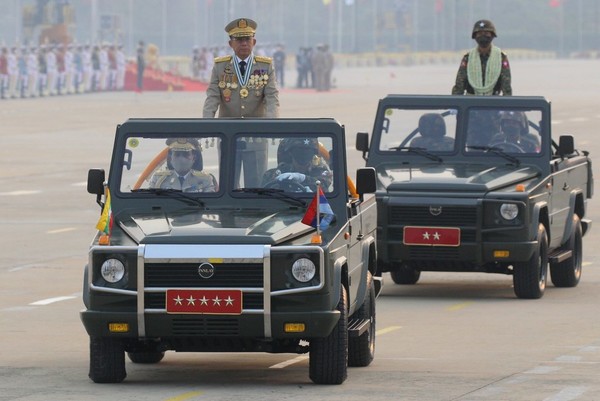This article was first published on EAF.
The Czech Republic’s position as one of Europe’s most consistent supporters of Myanmar’s pro-democracy movement shows signs of weakening. Junta representatives gained unprecedented access to prominent Czech officials in 2024, giving the military regime in Myanmar propaganda victories.
The Czech Republic’s support for democracy in Myanmar stems from the early 1990s friendship between Vaclav Havel and Aung San Suu Kyi. In 1991, Havel nominated Aung San Suu Kyi for the Nobel Peace Prize — which she won — believing it would bring international attention to the people’s struggle against Myanmar’s military regime, which ruled the country from 1962. Havel also wrote the preface to Aung San Suu Kyi’s essay collection Freedom From Fear. He also provided material support to her party, the National League for Democracy party.
The Czech Republic granted asylum to dozens of Myanmar refugees in the early 2000s. Non-profit organisations like Burma Center Prague emerged to support people in exile and, in the 2010s, to assist Myanmar’s transition to democracy.
After the February 2021 military coup, the Czech Republic demanded respect for the November 2020 parliamentary election results and allowed the National Unity Government (NUG), the anti-junta shadow government, to open a representative office in Prague. It remains one of only two NUG offices in the European Union, with the other in France. The Prague office is headed by Linn Thant, a former student protester jailed after the 1988 uprising and granted political asylum in the Czech Republic in 2011.
NUG engagement with Czech officials proved substantial throughout 2022. NUG Human Rights Minister Aung Myo Min urged Czech Deputy Foreign Minister Jiri Kozak to address Myanmar’s human rights violations at the UN Human Rights Council. NUG Foreign Minister Zin Mar Aung met with Czech Chamber of Deputies Speaker, Marketa Pekarova Adamova, who reaffirmed that only the elected civilian government held Czech backing.
In 2022, the Czech Republic informal Parliamentary Group of Friends of Democratic Burma/Myanmar was founded, led by politician Josef Flek. On the second anniversary of the coup in 2023, the group pushed a resolution through the Czech Parliament’s Foreign Affairs Committee condemning the junta’s human rights violations and calling for international support of the democratic movement.
France has shown similar commitment, with its Senate recognising the NUG as Myanmar’s official government in October 2021, consistently condemning the junta’s actions and engaging with NUG officials on several occasions.
Germany strongly condemned the coup in February 2021 and engaged with NUG representatives to a limited extent. Other EU states have shown less interest in the issue. Italy and Spain condemned the coup but limited their response to collective EU actions. Most other EU countries avoided significant engagement with the junta.
The Czech Republic initially restricted contact with junta representatives despite allowing their presence at the Myanmar embassy in Prague. It even downgraded its diplomatic relations, leaving its Yangon embassy without an ambassador. Similarly, the German embassy in Myanmar is now led by a charge d’affaires, effectively downgrading its diplomatic ties.
A concerning shift emerged in 2024. Junta representatives have started meeting with prominent Czech officials.Htuann Naung, charge d’affaires at Myanmar’s embassy in Prague, attended two diplomatic meetings in January 2024, the first hosted by Czech Foreign Minister Jan Lipavsky and the second by Czech Senate President Milos Vystrcil. Subsequent encounters included Czech Prime Minister Petr Fiala in February and Deputy Foreign Minister Eduard Hulicius in August, culminating in a handshake with Czech President Petr Pavel in October.
The Global New Light of Myanmar, the junta’s mouthpiece, reported that Htuann Naung attended a Diplomatic Corps reception on Czech National Day and a State Decorations Ceremony on Czechoslovak Independence Day at Prague Castle. The junta uses photographs of Htuann Naung with Czech President Pavel at these events as propaganda to bolster its domestic and international legitimacy.
The junta exploits such encounters to project legitimacy. It did the same when Htuann Naung met with Jakub Starek, a district mayor in Prague, in 2023. Though Starek emphasised the meeting’s non-political nature, the junta leveraged these photos as propaganda to validate its regime.
This situation is concerning given the Czech Republic’s historical support for Myanmar’s democracy. While junta representatives gain visibility, NUG figures like Linn Thant face exclusion from high-profile events. The change risks undermining Czech solidarity with Myanmar’s democratic movement and demoralising democracy advocates who view the Czech Republic as an example of resilience against authoritarianism.
Recent global crises in Ukraine and the Middle East might explain this position shift. These conflicts have diverted attention from Myanmar’s civil war in Myanmar, perhaps making Czech officials less mindful of their Myanmar encounters.
The Czech position alone might not alter EU policy. The bloc adopted eight sanctions packages targeting the junta, suspended development funds and the ‘Everything but Arms’ scheme and its parliament supports the NUG. Yet Czech influence has been crucial in maintaining Myanmar’s presence on the EU agenda.
Closer Czech ties with the regime could reduce EU allies advocating for Myanmar’s anti-junta resistance. This shift by a long-term democracy advocate risks damaging the EU’s credibility as a champion of global human rights and undermining its broader policy strategies.
Federica Cidale is a PhD student in International Relations and Asian Studies at Palacky University Olomouc and Research Fellow at the Central Europe Institute of Asian Studies and at the Myanmar Studies Center. She can be reached at: federica.cidale01@upol.cz
Kristina Kironska is Co-Director of the Central Europe Institute of Asian Studies and Head of the Myanmar Studies Center at the Palacky University Olomouc. She can be reached at: kristina.kironska@upol.cz
